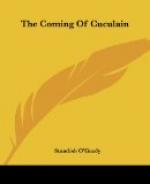That good knight stood midway between the goals, eastward from the players. Ever and anon with a loud clear voice he reproved the youths, and they hearkening took his rebukes in silence and obeyed his words. Cathvah came forth that day upon the lawn, and thus spoke one of the boys to another in some pause of the game, “Yonder, see! the Ard-Druid of the Province. Wherefore comes he forth from his druidic chambers to-day at this hour, such not being his wont?” And the other answered lightly, laughing, and with boyish heedlessness, “I know not wherefore; but well he knows himself.” And therewith ran to meet the ball which passed that way. There was yet a third who watched the boys. He stood afar off on the edge of the plain. He had a little shield strapped on his back, two javelins in one hand, and a hurle in the other. He was very young and fair. He stood looking fixedly at the hurlers, and as he looked he wept. It was the child who had been promised to the Ultonians.
CHAPTER III
DETHCAEN’S NURSLING
“Very small and beautiful like a star.”
—Homer.
“I love all that
thou lovest,
Spirit of delight;
The fresh earth in new
leaves drest,
And the blessed night;
Starry evening and the
morn,
When the golden mists
are born.”
Shelley.
Sualtam of Dun Dalgan on the Eastern Sea, took to wife Dectera, daughter of Factna the Righteous. She was sister of Concobar Mac Nessa. Sualtam was the King of Cooalney [Footnote: Now the barony of Cooley, a mountainous promontory which the County of Louth projects into the Irish Sea.] a land of woods and mountains, an unproductive headland reaching out into the Ictian Sea.
Dectera bare a son to Sualtam, and they called him Setanta, That was his first name. His nurse was Dethcaen, the druidess, daughter of Cathvah the druid, the mighty wizard and prophet of the Crave Rue. His breast-plate [Footnote: A poetic spell or incantation. So even the Christian hymn of St. Patrick was called the lorica or breastplate of Patrick.] of power, woven of druidic verse, was upon Ulla [Footnote: Ulla is the Gaelic root of Ulster.] in his time, upon all the children of Rury in their going out and their coming in, in war and in peace. Dethcaen [Footnote: Dethcaen is compounded of two words which mean respectively, colour, and slender.] sang her own songs of protection for the child. His mother gave the child suck, but the rosy-cheeked, beautiful, sweetly-speaking daughter of Cathvah nursed him. On her breast and knee she bare him with great love. Light of foot and slender was Dethcaen; through the wide dun of Sualtam she went with her nursling, singing songs. She it was that discovered his first ges, [Footnote: Ges was the Irish equivalent of the tabu.] namely, that no one should awake him while he slept. He had others, sacred prohibitions




